Tyler Stewart founded Pandemonium Books & Games in 1989, and has been happily serving Boston’s science fiction fans ever since. The store was originally based in the book mecca of Harvard Square in Cambridge, Massachusetts, until moving six years ago to bigger and cheaper digs in nearby Central Square. Pandemonium hosts events every night, including author signings and game tournaments.
If you want to make Tyler’s day, simply walk up to him and ask him to recommend a book. Chances are that he’ll drop whatever he is doing and take you to browse among the shelves, pointing out titles likely to please. Tyler notes, “While I’ll read almost anything to do with science fiction, fantasy or horror, I have a definite bias towards fantasy. I also prefer the protagonist to be a least a little sympathetic. I need to care about the characters in order to finish a book. While new ideas always are appreciated, I also really enjoy when authors logically extend an old idea in new and clever ways, like a magician taking a hat out of a rabbit.”
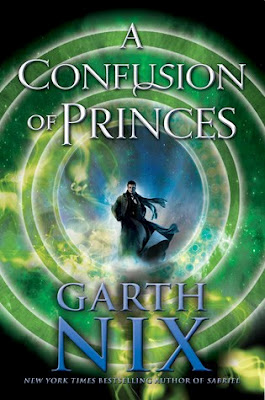 A Confusion of Princes by Garth Nix
A Confusion of Princes by Garth Nix
I don’t read a lot of Young Adult novels, but I read everything by Garth Nix. Books like A Confusion of Princes are the reason why. The book is a great little coming-of-age story set in an over-the-top space opera universe. The technology of the Empire is especially a treat. You can tell Nix spent a lot of time developing this amazing braided system of Mektek, Biteck and Psitek. Just about every tool in the Empire, be it spacesuit, starship, or Prince of the Empire, is an amalgamation of these three faces of future science. Much fun!
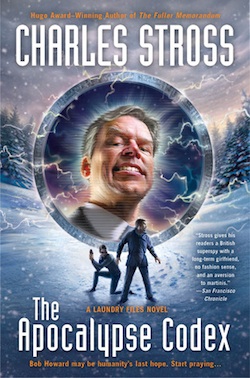 The Apocalypse Codex (Book #4 of the Laundry Files) by Charles Stross
The Apocalypse Codex (Book #4 of the Laundry Files) by Charles Stross
With the Laundry novels, Stross has found a sweet spot connecting spy novels and Lovecraftian fiction, Both genres share the idea that knowledge is inherently dangerous: “There are things mankind is not classified to know.” With each novel Stross sends spy Bob Howard further into this bleak universe, adding just enough action and Dilbert-style bureaucratic humor to keep things from getting too depressing. Bob is a great character, and he keeps getting better even as his higher-ups fast-track him for upper management. This involves increasingly dangerous missions, and weeks of Professional Development training. Bob isn’t always sure which is worse.
Each of the books in the series is a tribute to a different iconic British spy. In The Apocalypse Codex, Stross tackles Modesty Blaise, the 1960’s comic strip heroine who was also the subject of 13 novels and three movies. I haven’t read any Modesty Blaise, but now I’ll probably have to, simply because I like capers involving competent female protagonists, exotic weaponry, and trusty sidekicks. Persephone Hazard is a great foil for Bob. While they are both highly skilled operatives, her flashy James Bond-like style highlights Bob’s quiet, dogged determination to get the job done. If you like spies, Lovecraft and geeky humor, this series is for you.
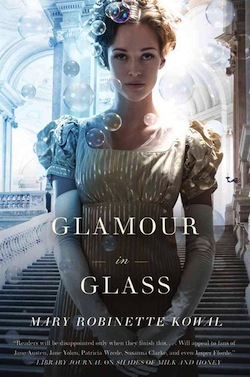 Glamour in Glass (sequel to Shades of Milk of Honey) by Mary Robinette Kowal
Glamour in Glass (sequel to Shades of Milk of Honey) by Mary Robinette Kowal
I always feel a little trepidation when it comes to reading a sequel to a beautifully written self-contained first novel. Can the author capture and bottle the same lightning again? As it turns out: yes, she can. The writing style in Glamour in Glass is still that mix of gorgeous Jane Austen flavor covering a more modern mode of expression, but the plot of Glamour in Glass has very little Jane Austen in it. The book takes place outside of England! It deals with espionage and military secrets! It even has action! Most importantly, where all of Austen’s books end with the heroine marrying happily, this book begins with the heroine having been married for a few months, and explores the matrimonial state in a way that Austen never did (or likely could). As Mrs. Vincent, our Jane has to deal with the lack of public recognition and respect for her skills of glamour. Kowal is willing to ask more modern questions. Should pregnancy end a wife’s career? What should she do if her husband starts lying to her? I cannot wait for the next book in the series.
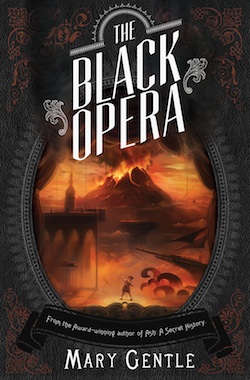 The Black Opera by Mary Gentle
The Black Opera by Mary Gentle
The Black Opera is a blast. It is a beautifully written piece of historical fantasy set in an alternate kingdom of the Two Sicilies in “the curious gap in European history, the two decades between the battle of Waterloo and the arrival of the Victorian age; when bel canto opera flourished, and the word ‘scientist’ was first coined.”
In this world, music has power. At the command of King Ferdinand II, our hero Conrad Scalese must compose and stage an opera of sufficient quality to counter a “black opera” put on by The Prince’s Men, a secret society of Gnostics. I know nothing about opera, but it doesn’t matter. The book is meticulously researched, and the author gives you a crash-course introduction to bel canto opera as Conrad frantically scurries to complete his work. The intrigue is wonderfully done as the Men take notice of his attempts and move to stop him.
Every time I had a question, the author was there a plausible answer. I say “plausible” because, of course, traitors and disinformation abound. I couldn’t guess the ending to this story; I know my tropes, and this novel confounded them. How does one write about two operas duking it out? How does that possibly end? The author pulls off the ending beautifully, which even gave me an honest-to-goodness frisson of wonder at the climax as everything falls into place. As everything falls to pieces. Magnificent!
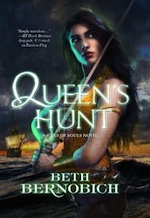 Queen’s Hunt (River of Souls series #2) by Beth Bernobich
Queen’s Hunt (River of Souls series #2) by Beth Bernobich
William Faulkner said, “The past isn’t dead. It isn’t even past.” This is especially true of the world of Queen’s Hunt. Here, everyone remembers one or more of their past lives, in the same way that you or I would remember our dreams from last night. Some people barely remember dim fragments, while others retain very clear memories of several lifetimes. This is the idea that was introduced at the beginning of Passion Play, the first book in the River of Souls series, but took a back seat in favor of a more traditional “girl meets boy (again)” romantic storyline.
I was disappointed. Here’s this great idea! Play with it! Incorporate it into your world! As it turns out, that happens in Queen’s Hunt. There, the reader discovers that ancient memories have actually been driving both the lives of the characters and history of the world they live in. The story broadens in scope and depth as the author moves past the romance of the protagonists of Passion Play as they struggle to prevent unnecessary war between kingdoms. The author introduces new characters to create an ensemble cast. Each character has their own agenda, some rooted in ancient memories, some resulting from the actions of the original two protagonists of the first volume. The result is an intricate tapestry of fate and unexpectedly sweet romance. Recommended.
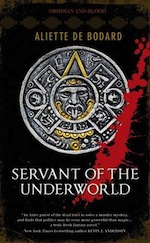 Servant of the Underworld (Obsidian and Blood #1) by Aliette de Bodard
Servant of the Underworld (Obsidian and Blood #1) by Aliette de Bodard
In the Aztec Empire, a generation before Cortez is due to arrive, Acatl is the High Priest of Mictlantecuhtli, God of the Dead. His responsibilities include overseeing funeral rites and easing the passage of the dead into Mictlan, the underworld. He also fights crime. No, really! Part of Acatl’s job is looking into murders caused by magic, as he is responsible for maintaining the boundaries between the underworld and the mortal world of the Fifth Sun. When a priestess vanishes screaming from her quarters in a girl’s school, leaving only a pool of her blood, Acatl is called in to investigate. Before he knows it, he is plunged into an intrigue that includes his estranged brother, Aztec royalty, and the gods themselves. I love fantasy mysteries when they are done well. They are hard to pull off, for not only does an author have to come up with an interesting puzzle for the reader, she also has to give enough background so the reader knows what is and is not possible. Every fantasy mystery has to recreate from scratch its own brand of forensic “science.”
Is Acatl able to determine by magic whether a death has occurred in a given room? Yes, he is. Are there limits to what he can do with priestly magic? Yes, there are! The author does a remarkable job of not only describing with effortless detail Aztec society and magic, but also fitting in mysteries in such a way as to make them seem an integral part of Aztec history and culture. The other books in the series are great, as well, and I am very curious as to whether the series will run up to the arrival of the Spanish and how the two paradigms will intersect.
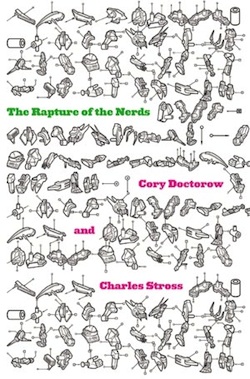 The Rapture of the Nerds (or How Huw Jones was Mugged by the Future) by Cory Doctorow and Charles Stross
The Rapture of the Nerds (or How Huw Jones was Mugged by the Future) by Cory Doctorow and Charles Stross
For some years Cory Doctorow and Charles Stross have written a good deal about the possibility of the Singularity, when all curves tend toward infinity and the future dissolves into smoke (read Down and Out in the Magic Kingdom and Accelerando for a taste of what they’ve been doing), but The Rapture of the Nerds marks their first full length cooperation.
The result is great fun and extremely readable. You should, however, be warned: RofN is slapstick. The book opens decades after the advent of the Singularity, and some seven out of every eight humans have shed their mortal flesh and ascended into the great cloud of computronium which orbits the sun. The billion or so holdouts remaining are attempting to adjust to the new dispensation. Our hero, Huw Jones, a Welsh potter of unusual antecedents, is one of them. In a normal science fiction novel, Huw would be expected to grapple with the perils and promises of the Singularity, dealing with human monsters or alien villains, and generally acting in a serious and adult fashion. In RofN, however, Huw has very little time for this, since the rules of slapstick require that he spend most of his time being pursued across the stage in a state of terrified embarrassment. When, for instance, he realizes that his voice is being taken over by an alien mechanism, he’s tipped off by the fact that it manifests itself as a bad case of Tourette’s Syndrome (note that the authors refuse to use … or ***, so you might wish to keep the book out of the reach of children, unless you actually want to explain The First Church of the Teledildonic).
In fact, before picking up RofN, you should ask yourself whether you are likely to be offended by Doctorow and Stross being brutally abusive about religion, gender relations, Objectivism, peak oil, or anything else that readers might insist on taking seriously. If so, pass it by. If not, however, pick it up, because there’s a great deal of good stuff mixed in with the slapstick. The authors have been soaking themselves in the field for decades, and they couldn’t avoid filling the book with SF references even if they wanted to. (And they don’t want to.) When Huw is dealing with an alien who may or may not be his father, for instance, he notices, “something approximating a twinkle in his eyes. It’s a vast, cool, and unsympathetic twinkle, but it’s still there.” – Charles Schafer
Tyler Stewart is the founder of Pandemonium Books & Games in Boston.










